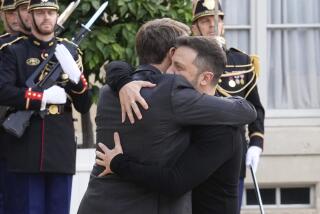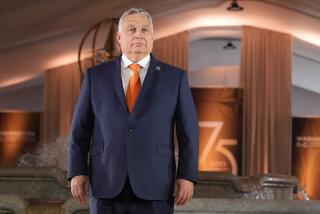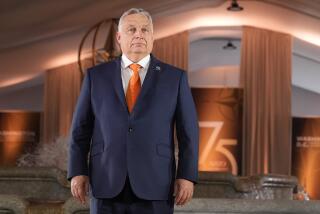Chinese President Xi’s trip to Europe: ‘Charm offensive’ or canny bid to divide the West?
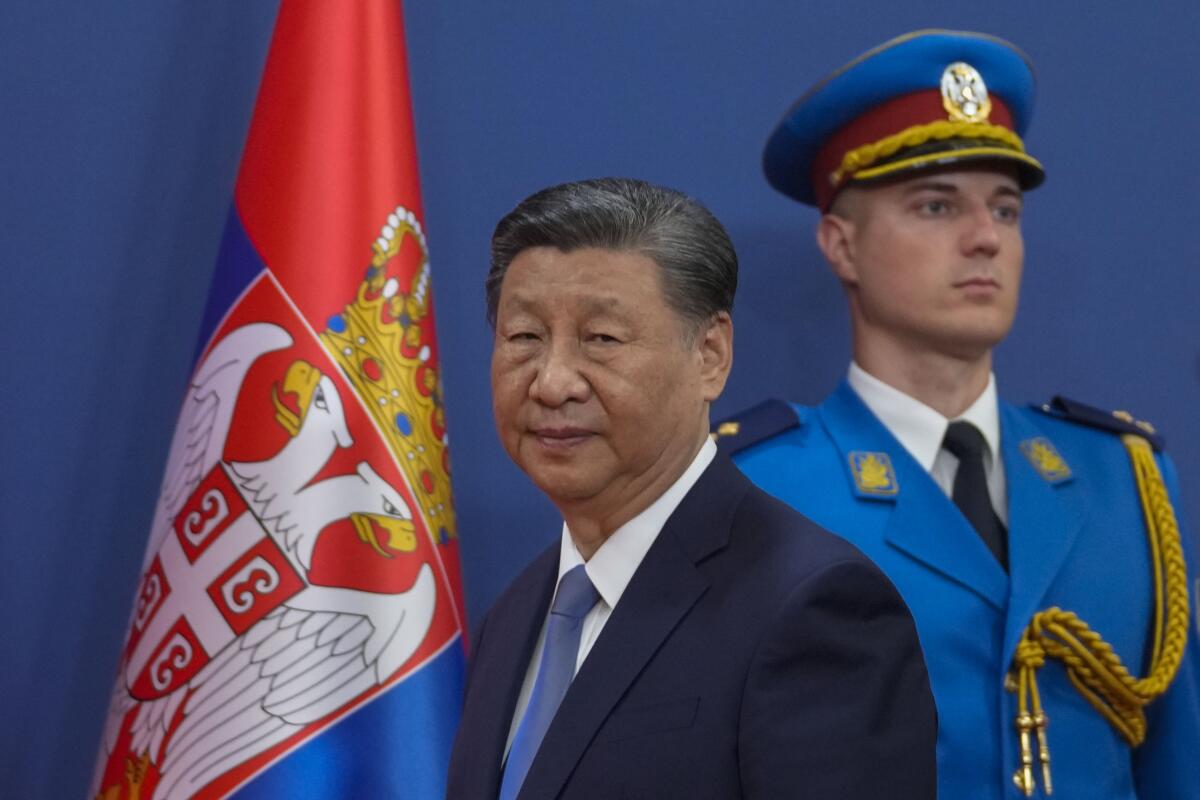
- Share via
Fine brandy, a Tour de France jersey and old grudges against NATO: On his first European tour in five years, Chinese President Xi Jinping is engaging in a diplomatic dance that is seen by some as a concerted Chinese bid to stress-test the transatlantic alliance.
With Washington watching warily from the sidelines, Xi’s whirlwind visit this week has taken him to France, Serbia and Hungary, with a very different tone and agenda at each stop, but with some overarching goals in common.
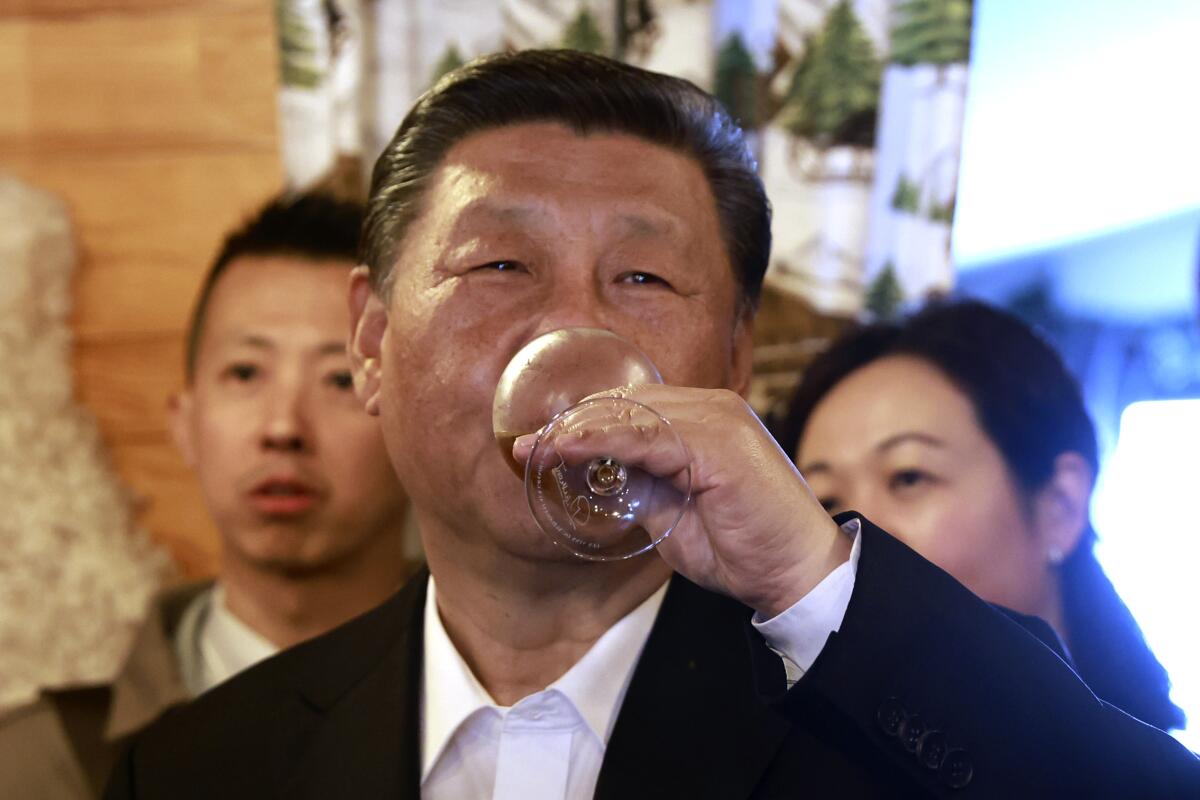
Taken as a whole, the Chinese leader’s European trip is seen as both a charm offensive and a hard-nosed display of realpolitik on matters such as trade and the war in Ukraine — at the expense of a united Western front on both.
During the visit, Xi has nodded to traditional European centers of power such as France and the European Union — but also laid heavy emphasis on deepening ties with autocratic allies on the continent’s fringe.
In the peaks of the cloud-shrouded Pyrenees, Xi accepted a jersey from France’s famed bicycle race and joined President Emmanuel Macron in calling for a truce in all global hostilities during the 2024 Summer Olympics in Paris.
Kharkiv, Ukraine’s second-largest city, is facing intense Russian airstrikes, but its residents are defiant. “We can stand up, no matter what they do,” one said.
In Serbia’s capital, Xi’s arrival coincided with the 25th anniversary of NATO’s mistargeted bombing of the Chinese Embassy in Belgrade — an episode that still stirs anti-Western fury among Serbian nationalists.
And in Hungary, cementing a Chinese economic footprint within the European Union, Xi offered warm praise for Prime Minister Viktor Orban, the illiberal leader who has been a thorn in the side of European allies in the more than two years since Russia’s full-scale invasion of Ukraine.
With growing mistrust between the the U.S. and China, an election between President Biden and Donald Trump looks like a lose-lose scenario for China.
Some analysts saw Xi’s trip as meant to drive home the message that China will seek to counter U.S. influence wherever it can, and pointedly remind even close American allies to consider whether their own interests run counter to those of Washington.
“There’s lot of press commentary that the Chinese are engaged in a ‘charm offensive,’ ” Evan Medeiros, the former China director at the National Security Council, said in a video interview with Foreign Policy magazine.
While that may be so, he said, the three stops on the tour were specifically chosen in service of “advancing Chinese interests in ways meant to undermine the priorities of both the European Union and NATO.”
Other analysts also described the visit as a simultaneous act of wooing the West and seeking to divide it.
“It embodies Beijing’s skillful navigation of the delicate balance between aggressively advancing its economic imperatives and preserving amicable diplomatic relations, possibly even bolstering its sway in certain quarters of the continent,” political economist Sona Muzikarova, a political economist, wrote in a commentary for the Atlantic Council.
Amid worsening Ukraine war outlook, an infusion of American military aid is seen as crucial in the fight against Russian invaders. Will it be enough?
Xi’s visit came as Europe and the United States are presenting a largely united front in support for Ukraine. But there are some cracks, and China showed signs it might seek to exploit them.
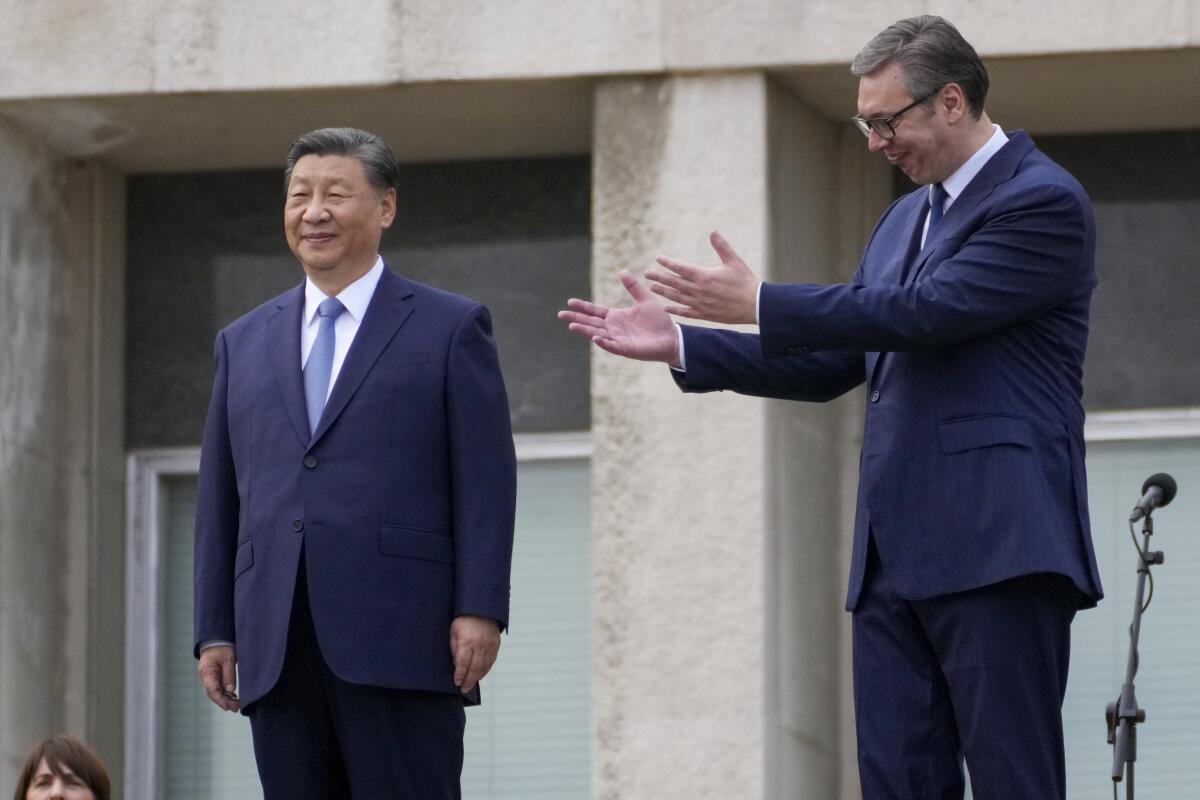
Weeks before Russia launched its war in Ukraine, Beijing and Moscow declared themselves in a “no limits” relationship — widely seen as in effect greenlighting Russia’s February 2022 invasion. But since then, China has portrayed itself as a neutral party in the Ukraine war.
That has been met with skepticism in Western quarters, but during Xi’s stop in France, Ursula von der Leyen, the president of the European Commission, made a point of praising China for playing “an important role in de-escalating Russia’s irresponsible nuclear threats” in connection with the fighting in Ukraine.
But despite that gesture of conciliation, Von der Leyen and Macron made no visible headway in persuading Xi to use his influence with Russian President Vladimir Putin to bring an end to the conflict.
Russia announces plans to hold drills near Ukraine simulating the use of battlefield nuclear weapons.
Instead, Xi pushed back hard against assertions, primarily by the United States, that China has helped prop up Moscow’s war effort.
With Macron at his side, the Chinese leader declared that his government was “not at the origin of this crisis, nor a party to it, nor a participant.” And he said the Ukraine war should not be used as a pretext to “cast blame, smear a third country and incite a new Cold War.”
At the same time, Xi expressed broad support for peace, endorsing Macron’s call for an “Olympics truce” — a hiatus to hostilities in Ukraine and elsewhere during the Summer Games. But such a halt to fighting appeared unlikely to take hold in Ukraine any time soon.
As summer approaches, Russia has been aggressively moving to try to pierce Ukraine’s defense along the front lines and has launched a near-nightly onslaught of missile and drone attacks meant to smash the country’s power grid.
Like most of Xi’s diplomatic forays, this one is centered heavily on trade. Most countries have their own specific bilateral interests in dealings with China and use high-level meetings to try to advance them.
Macron brought up some particularly French concerns, including China’s threat of tariffs on cognacs. As a symbolic sweetener for his insistence, the French president’s gift offerings to Xi included an Armagnac from France’s southwest, one of the liqueurs at risk of the damaging Chinese sanctions. And in an equally symbolic move, the Chinese side said that for now, the brandies would have a reprieve.
Larger trade issues, though, are proving considerably more contentious.
China is upset about a European Union investigation, launched last year, of Chinese subsidies for its domestically produced electric vehicles for export. The EU considers the subsidies a threat to Europe’s auto industry, but some German carmakers have publicly objected to the investigation, fearing it could launch a trade war and harm joint ventures.
Macron and Von der Leyen teamed up during Xi‘s visit to argue the EU’s case on Chinese practices deemed predatory, but the talks did not include officials from Germany, Europe’s largest economy.
Muzikarova, the Atlantic Council political economist, said intra-EU trade disagreements gave China an opportunity to “deploy its signature ‘divide and conquer’ strategy,” noting that EU member Hungary “has been especially useful to this end.”
A growing number of Americans consider China an enemy whose influence should be contained, a Pew Research study finds
In Budapest, the last stop on Xi’s European tour, the Chinese finalized a number of agreements with Orban that will significantly deepen economic ties, even while the EU has taken a more protectionist stance.
“We live in a multi-polar world order, and one of the main columns of this new world order is China,” the Hungarian leader declared after hosting Xi at his capital’s Buda Castle.
As Orban has found himself increasingly on the outs with other European leaders — over Ukraine, his government’s antidemocratic moves and Hungary’s warmth toward Russia — Xi lavished praise on the Hungarian prime minister.
Orban, a darling of U.S. conservatives aligned with presumptive Republican presidential nominee Donald Trump, has worked to block NATO expansion and EU aid to Ukraine. In March, he made a pilgrimage to Trump’s Mar-a-Lago resort and declared that the former president, if reelected, could instantly halt the war by cutting off Ukraine assistance.
Taiwan is celebrating the latest winner of ‘RuPaul’s Drag Race,’ Nymphia Wind, after she called the island a country.
In an ode that appeared in the pro-government outlet Magyar Nemzet on the eve of his visit, the Chinese leader praised Hungary’s “independent” foreign policy — comments seen as encouraging Hungary to continue defying the North Atlantic Treaty Organization and the EU.
Serbia, for its part, used Xi’s visit to highlight its quarter-century-old grievance against NATO over the destruction of the Chinese Embassy in a U.S. airstrike, which came as the alliance moved against Serbia during the Kosovo war. Xi arrived in Belgrade on Tuesday night, coinciding with the bombing anniversary.
The two countries, which announced during the visit they are implementing a free-trade agreement beginning in the summer, also offered mutual support over the sensitive issue of territorial claims rejected by most of the rest of the world. Serbia backs China’s stance that Taiwan is not a sovereign country but a breakaway province, while Beijing supports the Belgrade government’s claim to Kosovo, which declared its independence from Serbia in 2008.
China lifted its one-child policy nearly a decade ago. A growing number of couples aren’t having any.
More to Read
Sign up for Essential California
The most important California stories and recommendations in your inbox every morning.
You may occasionally receive promotional content from the Los Angeles Times.







